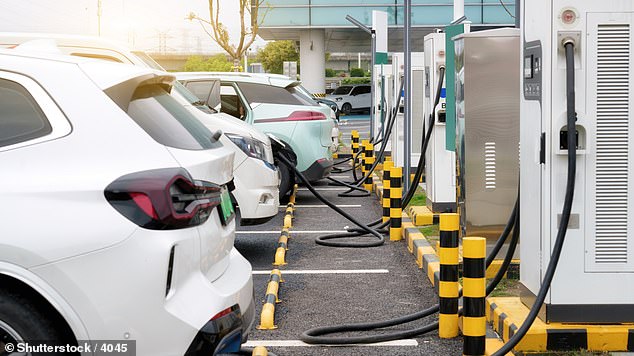Only one in ten private buyers will choose to purchase an electric car in 2024, after being deterred by high prices and a lack of charging infrastructure
Only one in 10 private buyers opted for an electric car last year, despite an ‘unsustainable’ £4.5 billion price cut offered by car manufacturers.
As a result, the sector has not achieved the government-imposed target for emission-free car sales in 2024, figures show.
Buyers were put off by high prices and lack of charging infrastructure; 60 percent of consumers opted for a gasoline engine during the year.
According to the Society of Motor Manufacturers and Traders (SMMT), only 10.1 percent (or 75,346) of cars sold to private customers were fully electric vehicles.
That’s despite carmakers offering £4.5 billion in discounts in a bid to tempt consumers.
Industry leaders said the price cuts were “not sustainable in the long term” and urged the government to help consumers make the switch from diesel and petrol.
It comes after Vauxhall owner Stellantis announced plans to close its Luton factory in November, putting more than 1,100 jobs at risk amid mounting pressure to adapt to net zero.
Industry giants such as Nissan have warned that the targets would have an ‘irreversible impact’ on the UK car industry.
Only 10.1 percent – or 75,346 – of cars sold to private customers last year were fully electric vehicles (file photo)

High prices and a lack of charging infrastructure were thought to be factors driving potential electric vehicle buyers (file photo)
SMMT chief executive Mike Hawes said increasing sales of electric vehicles come at a “huge cost” for manufacturers, adding: “The billions invested in new models have been supplemented by generous incentives that are not sustainable.
‘We need rapid results from regulatory review and urgent substantive support for consumers – otherwise investment in the automotive sector will be at risk and the jobs, economic growth and net-zero ambitions we all share will be at risk. ‘
In total, 19.6 percent of all car sales were electric – a record level achieved by fleet and business customers eligible for tax benefits, rather than private customers.
However, the sector lagged behind the 22 percent target set by the ministers. Manufacturers who fail to meet zero-emission vehicle targets face a fine of £15,000 per car.
But last night the government said it was “confident” no car manufacturer would be fined, due to the “flexibility” in the rule that gives them extra credit for meeting carbon emissions reduction targets.
Preliminary data suggests that if this is taken into account, the car market as a whole will have reached the 22 percent target, the Ministry of Transport said. The threshold will increase annually until fossil fuel engines are completely phased out by 2030.
Auto Trader managing director Ian Plummer said: ‘Reaching the next target of 28 per cent by the end of this year will be an incredible challenge.’
